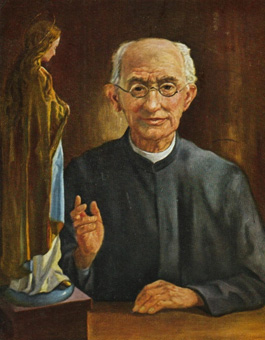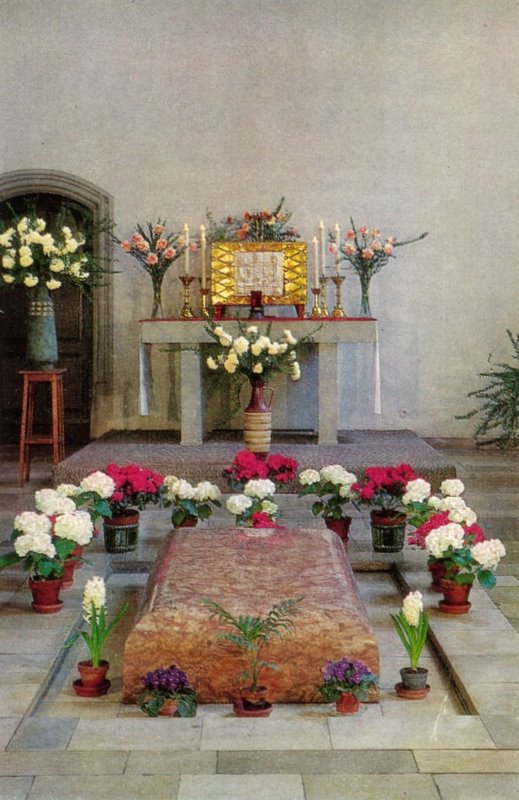Servant of God William Eberschweiler, SJ
Born: December 5, 1837
Died: December 23, 1921
 William Eberschweiler, the eldest of five boys of a family of seven children, was born in Puttlingen, Germany. As a child, his family moved to Bitburg where he attended the parish school and later in 1851 went to Trier for his secondary education where he lived in a diocesan-sponsored student residence. He began to think of joining the Vincentians after he heard a friend who had entered the Vincentians in Paris described the joys of its religious community life. However after attending an annual retreat given by a Jesuit, he also decided to join the society. His brother, Fritz who also attended the same retreat also decided, independent of him, to join the Society. So both brothers entered the Jesuit novitiate at Friedrichsburg, near Munster, on September 30, 1858. Fritz later went to the United States and worked as a missionary among the Indians in Montana. Two younger brothers also became Jesuits; one of them, Charles, went to the United States, and first worked among Indians, but later became spiritual director at a diocesan seminary in Columbus, Ohio. He died there.
William Eberschweiler, the eldest of five boys of a family of seven children, was born in Puttlingen, Germany. As a child, his family moved to Bitburg where he attended the parish school and later in 1851 went to Trier for his secondary education where he lived in a diocesan-sponsored student residence. He began to think of joining the Vincentians after he heard a friend who had entered the Vincentians in Paris described the joys of its religious community life. However after attending an annual retreat given by a Jesuit, he also decided to join the society. His brother, Fritz who also attended the same retreat also decided, independent of him, to join the Society. So both brothers entered the Jesuit novitiate at Friedrichsburg, near Munster, on September 30, 1858. Fritz later went to the United States and worked as a missionary among the Indians in Montana. Two younger brothers also became Jesuits; one of them, Charles, went to the United States, and first worked among Indians, but later became spiritual director at a diocesan seminary in Columbus, Ohio. He died there.
William had to interrupt his novitiate twice because of his fragile health. During his two absences, he spent the first at Gottendorf for two months and the second, he went to Feldkirch, Austria to help prefect students. He finally took his three vows of religion on January 6, 1861. After spending a year at Munster studying humanities, he started his philosophy at Aachen before going to Maria Laach for theology. He was ordained there on September 13, 1868 at the age of thirty. For the next four years, he was directing our Lady’s sodality until he was made master of novices in Gorheim, near Sigmaringen, until its closure by the Kulturkampf, an anti-Catholic movement originating in Prussia. The German Jesuits found refuge in France, Italy and the Netherlands where Fr Eberschweiler became rector of the exiled German juniorate until 1876 when he became Spiritual director of the young Jesuits in the same ommunity. After eight years in 1884 he went to England as spiritual director of the theological students at Ditton Hall where he stayed for six years before returning to Wijnandsrade. When the juniorate moved to nearby Exaten in 1894, Fr Eberschweiler went along and remained the juniors’ spiritual director until his death.
 Fr Eberschweiler was a spiritual guide to his Jesuit brethren for more than forty-five years and was especially qualified for his task as God had blessed him with many extraordinary graces and thus was well endowed to instruct others in prayer, in the religious life and how to grow in the love of God. In December 1917 when he was in his eightieth year, he was hospitalized when a growth on his right hand would not respond to ordinary treatment and his physician diagnosed that it had to be operated on. Despite the operation, his growth would not heal and since there was no improvement, the physician suggested that the top part of the thumb be amputated. Fr Eberschweiler, however suggested that it be done after he had a chance to make a novena to St Francis Xavier. On the last day of the novena, he woke up with a high fever; he had pneumonia and the amputation had to be postponed. When his pneumonia passed, the surgeon had to be out of town for a few days and the operation had to be postponed yet again. When the surgeon returned he found the thumb so improved that the amputation was no longer necessary. Fr Eberschweiler was able to celebrate Mass although his thumb and fingers remained stiff.
Fr Eberschweiler was a spiritual guide to his Jesuit brethren for more than forty-five years and was especially qualified for his task as God had blessed him with many extraordinary graces and thus was well endowed to instruct others in prayer, in the religious life and how to grow in the love of God. In December 1917 when he was in his eightieth year, he was hospitalized when a growth on his right hand would not respond to ordinary treatment and his physician diagnosed that it had to be operated on. Despite the operation, his growth would not heal and since there was no improvement, the physician suggested that the top part of the thumb be amputated. Fr Eberschweiler, however suggested that it be done after he had a chance to make a novena to St Francis Xavier. On the last day of the novena, he woke up with a high fever; he had pneumonia and the amputation had to be postponed. When his pneumonia passed, the surgeon had to be out of town for a few days and the operation had to be postponed yet again. When the surgeon returned he found the thumb so improved that the amputation was no longer necessary. Fr Eberschweiler was able to celebrate Mass although his thumb and fingers remained stiff.
After five months in the hospital, Fr Eberschweiler returned to his community and lived a semi-retired life. Knowing that death was near, he wrote:
“The Lord is near! The Lord is near! Rejoice, again I say rejoice, but in the Lord!” While saying Mass on the 16th December, he began to tremble and a great weakness came over him. Then his lungs began to fill and his worn-out body was no longer
able to fend off infection. Knowing his condition was serious, he calmly said: “I am ready.” He became progressively weaker and on 22nd he was only able to repeat the prayers that the priest, who sat next to his bed, recited for him. Then to the priest’s surprise, Fr Eberschweiler asked him to write a letter to a priest-friend in the United States. In the letter he told the friend that for the past thirty years Jesus had personally promised him, not once, but countless times, that his death would be happy and peaceful. He now had no doubt of it and he looked forward to it with great calm and even desire as it approached him. He also said that Our Lady had given him the same assurance as did her Son. He ended by asking his friend to remember him in his prayer. On the following morning, December 23, 1921, with firm assurance in God’s presence at his hour of death, Fr Eberschweiler peacefully entered eternal life.
Fr Eberschweiler was buried on December 25 in the Jesuit cemetery in Exaten. His remains were transferred to Trier in May 1958 where they were interred in the seminary church. His cause is presently undergoing investigation in Rome.
